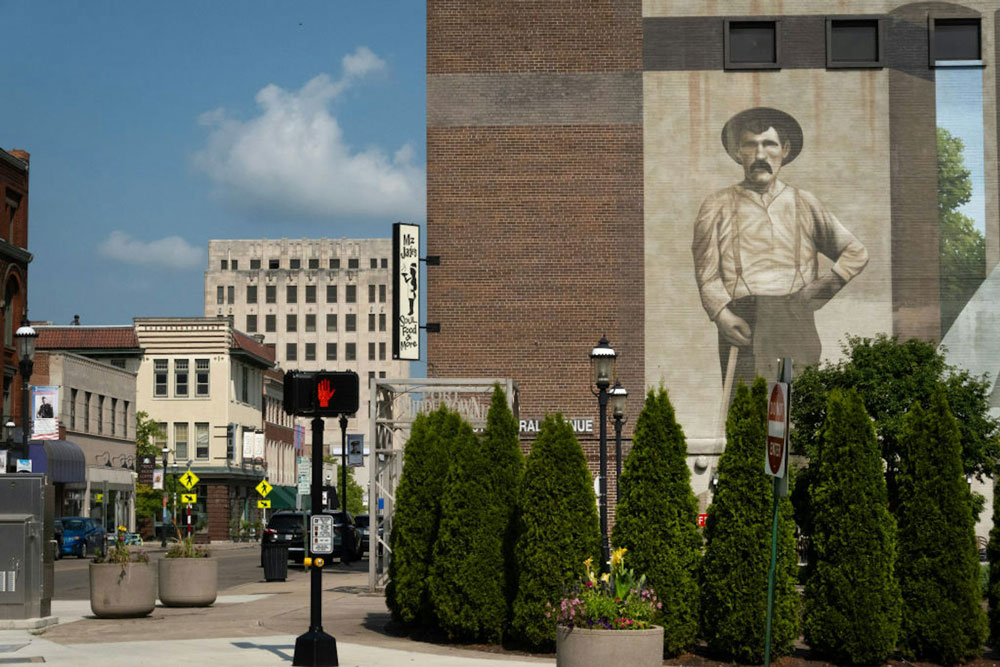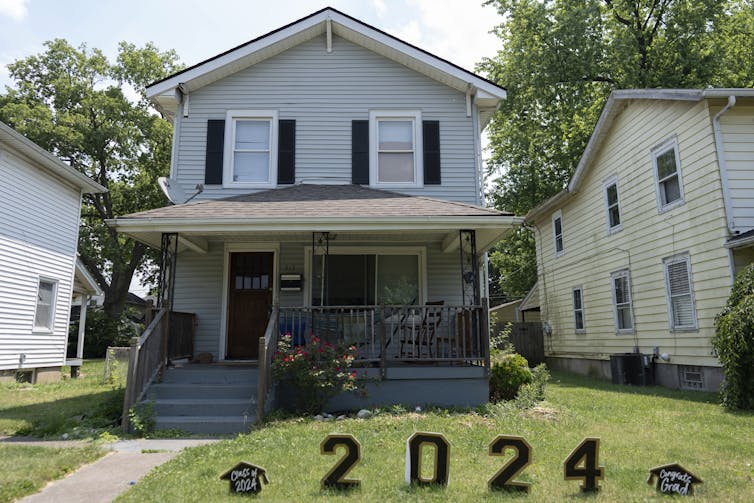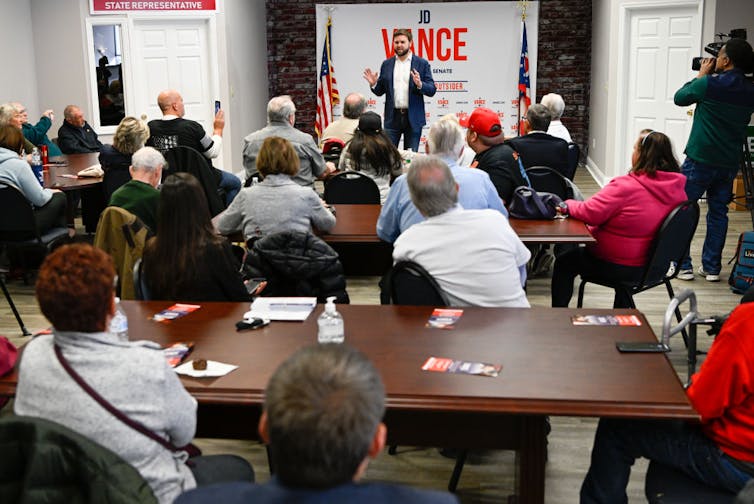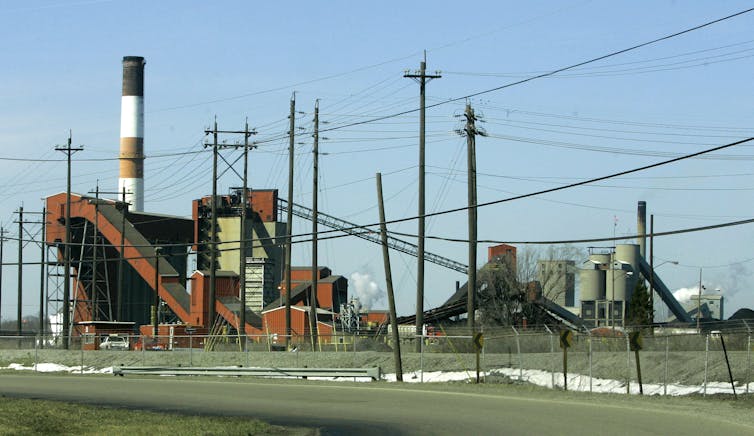
By Matthew Smith
With Sen. JD Vance named Donald Trump’s running mate, commentators are dusting off Vance’s 2016 memoir, “Hillbilly Elegy,” to explain America’s political moment.
Eight years ago, Vance was a Never-Trumper, comparing Trumpism to “cultural heroin” in an op-ed for The Atlantic. Yet Vance’s book about growing up in a struggling city in southwestern Ohio became a go-to primer for explaining the Trumpian turn in American politics. One reviewer even likened Vance to an Appalachian Ta-Nehisi Coates, revealing white, blue-collar America to outsiders in the same way that Coates’ writing explained Black America to white readers.
Today, with Vance on the Republican presidential ticket, national attention is once again turning to Middletown, Ohio. His hometown – just north of Cincinnati – risks becoming an abstract symbol of Rust Belt America. Ironically, it is easy to lose sight of the city’s rich, distinctive heritage, from which Vance’s memoir drew its potency.
As a British-born scholar of religion and immigration, I stumbled into the study of Appalachia. Twenty years ago, I could not have guessed the difference between a banjo and a mandolin, and would struggle to name a single bluegrass song. Dubious portrayals such as the horror movie “Deliverance” shaped my impression of Appalachian folkways.
Before moving to southwestern Ohio from Scotland, I could not have imagined teaching Appalachian history, literature and geography in classrooms with the grandchildren of eastern Kentucky coal miners. But my students at Miami University’s regional campuses taught me as much as I taught them – especially in Middletown, where in 2018 I read “Hillbilly Elegy” with my “Intro to Appalachia” class.
City at the crossroads
Strictly speaking, southwestern Ohio is not part of Appalachia. The state’s southeast, adjoining West Virginia, is considered the foothills of this mountain region. The southwest, on the other hand, bordering Kentucky, is squarely Midwestern, but strongly infused with Appalachian heritage.

Marli Miller/UCG/Universal Images Group via Getty Images
As in Appalachia, varied landscapes and mass migration have shaped this corner of the state. In the mid-20th century, economic upheaval – most notably mechanization in the coal mining industry – pushed Vance’s grandparents and many thousands of fellow Appalachians to seek new prospects in the Midwest, especially Ohio. This migration brought with it the sounds of mountain and gospel music, the fervent faith of the Baptist and Pentecostal churches, and extended family networks that spanned generations.
Despite the traditional values borne by Appalachian migrants, Vance grew up in a world where the pejorative “hillbilly” retained the sting of prejudice, and where deindustrialization fed into cycles of unemployment and despair – patterns familiar in many areas of the United States that feel left behind by economic change.

AP Photo/Carolyn Kaster
“Our homes are a chaotic mess,” he wrote in “Hillbilly Elegy.” “We scream and yell at each other like we’re spectators at a football game.” Yet family ties, especially to Appalachia – in Vance’s case, his grandparents’ hometown of Jackson, Kentucky – were among the few enduring strands of stability.
“My grandparents uprooted themselves from the real Kentucky and relocated to Middletucky in search of a better life,” wrote Vance, referencing Middletown’s sardonic nickname, “and in some ways they found it.” But they maintained ties across the Ohio River, and Vance’s fondest childhood memories were summer visits with family in Kentucky.
By contrast, domestic violence and his mother’s heroin addiction overshadowed his homelife in Middletown. Like many children in this environment, Vance was raised by his grandparents, “Mamaw and Papaw” – to whom he attributed the tough love that set him on course to later succeed in the Marine Corps and at Yale Law School.
Mixed response
Many readers from Appalachia objected to “Hillbilly Elegy,” alleging Vance vilified their culture with bleak descriptions of opioid abuse, family dysfunction and social decay.
Just as importantly, many people criticized his analysis of what ailed the region. Vance described a culture of “learned helplessness,” in which the people around him lost self-reliance thanks to welfare dependency and moral decline. The region’s challenges “were not created by governments or corporations or anyone else,” he wrote. “We created them, and only we can fix them.”
Critics argued that this message deflected valuable attention away from the importance of wider factors like economic investment and education – though Vance had written that the book was not about policies, but showing “what goes on in the lives of real people when the economy goes south.”

Gaelen Morse/Getty Images
Plenty of my students objected to his book on just these grounds, but their wide range of responses revealed the complex nature of the region.
Sadly, the depiction of addiction, hardship and struggle resonated with many students. But not all identified with Vance’s Appalachian background, and among those who did, not all had encountered such struggles. The handful of Chinese students observed that China, too, has its Appalachias: mountain provinces shaped by coal mining.
Closer to home, students who proudly identified as Appalachian differed over Vance’s warts-and-all representation. Some found it condescending, some unflinching. Others rejected the label of “Appalachian” but identified with Vance’s heritage, noting that they too traveled “home” for family reunions in Kentucky.
Looking toward tomorrow
Like many Rust Belt cities, Vance’s hometown continues to struggle. Deindustrialization has taken its toll – notably the decline of Middletown’s main employer, Armco Steel.

AP Photo/Al Behrman
Household median income is around US$25,000 below the national figure. The state report card estimates that just 1 in 5 high school graduates in Middletown is ready for the workforce, college or the military.
However, signs of progress belie the bleak depictions of “Hillbilly Elegy.” Entrepreneurial renaissance butts heads with Rust Belt stagnation in the city’s colorful downtown. Heavy manufacturing – immortalized by Kentucky songwriter Tom T. Hall’s “The Rolling Mills of Middletown” in 1972 – no longer drives the economy as powerfully as it used to.
Yet there are signs of growth and change. A 2022 study by the U.S. Bureau of Economic Analysis estimated that Ohio’s creative industries added nearly $25 billion to the state that year, and the fruits are evident in Middletown. Sorg Opera House, founded in 1891 by a local millionaire, reopened in 2017 as the city’s prestige destination for the performing arts. And in nearby Wilmington, the Industrial Strength Bluegrass Festival, founded by Middletown native and bluegrass musician Joe Mullins, welcomes nationally celebrated acts and audiences of thousands, drawn by the region’s rich artistic heritage.
Away from the glare of national politics, southwestern Ohio keeps building its future – and perhaps will proudly reclaim its unfairly maligned Appalachian heritage along the way.
![]()
Matthew Smith is Visiting Assistant Professor of History at Miami University.





























Tony Mac says
Another Look At Mr. James David Vance or Will the Real JD Vance Please Stand Up
He was born James Donald Bowman on Aug. 2, 1984, in Middletown, Ohio, an industrial city 30 miles north of Cincinnati and 20 miles south of Dayton. (So, not really Appalachia)
Long before J.D. Vance became the Republican nominee for vice president, he was known as Cpl. James D. Hamel, a combat correspondent in the Marine Corps, serving from 2003 to 2007.
Vance’s biological parents, Donald Bowman and Bev Vance, divorced when he was a toddler. He was later adopted by his mother’s new husband, Bob Hamel, and changed his name to James David Hamel. The name change preserved his nickname, JD
Vance claims he took his grandparents’ surname, Vance, in 2014, prior to his marriage to Usha Chilukuri. However, while the Yale Law School Alumni Association has him listed as graduating in 2013 as James David Hamel, the 2012 Yale Law Journal (October 2012, Volume 122, Number 1) has him listed as J.D. Vance, one of 58 other editors.
So exactly when and how Vance/Hamel actually changed his name remains somewhat of a mystery at this point. In most cases, you must file a petition with your local court to change your name. To do so, you may need to file paperwork and appear before a judge to complete the process. There is no record of a name change petition in Connecticut, Ohio or Kentucky. No reporter has ever asked how Vance accomplished this process or if his Social Security information is listed as Hamel or Vance.
The Law Practice
Vance graduated Yale Law in 2013, so his name on the degree would be James David Hamel, not JD Vance. In fact, the Yale Law School Alumni Association lists him as J.D. Hamel. So why does the Yale Law Journal show him as J.D. Vance in 2012 when he says he did not take that name until 2014? There is no record of such a name change in any Probate Court in Connecticut.
Interestingly, there is no record of Vance/Hamel ever belonging to the Bar Associations in Kentucky, California, Ohio, where he lived, or Illinois. His biography indicates he practiced as a lawyer for Sidley and Austin, but does not give the location of the office in which he legally practiced law nor the names of any clients he may have represented. There appears to be no record of Vance/Hamel passing the Bar exam anywhere.
So, this sketchy background calls for some answers:
Where and when did Hamel change his name officially to Vance 2012 or 2014?
Where and when did he pass the Bar exam?
Does his Social Security identification show him as Hamel or Vance?
Vance clerked for Judge David Bunning of the US District Court for the Eastern District of Kentucky. Did he take the Kentucky Bar?
This mutt doesn’t have a clue as to what he really believes, so much so that he doesn’t even know his actual name!
Laurel says
Tony Mac: But he does know who’s running the country, right?
Meow!
He is a billionaire’s puppet.
Thanks for the info, Tony Mac!
Jackson says
Vance was chosen for obedience. Niki Haley could never be VP. She ran against him so she’s not loyal. She’s also too smart for him. He gets uncomfortable around her. The bluster of a narcissist is a cover for deep insecurity. A well adjusted person can feel self assured but Donald can’t. He substitutes it with external props like a model for a wife, rich ostentatious surroundings and servile obedient associates. Vance will be thrown under the bus at some point. They always are. Pence almost lost his life. Donald could be called “the heart of darkness”. What amazes me is that he’s running for president and polling above 30%.